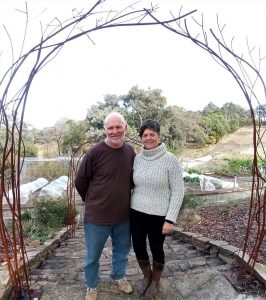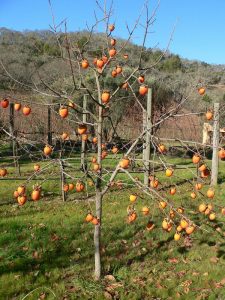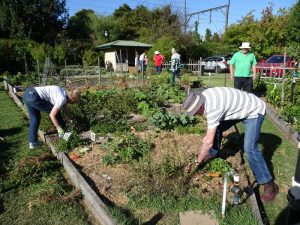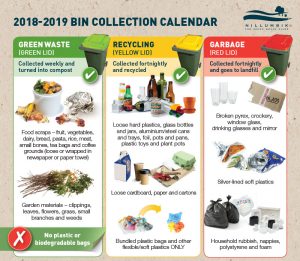Judy visits the garden of Paula and John McLeod
 Some of you will know Paula and John from Hurstbridge Farmgate. Judy Vizzari has now visited their extraordinary garden in Hurstbridge, veggie patch and all. As Judy says in the introduction to her writeup: “As I enter the driveway, I see a formal garden to my left, a dam to my right and, beside it, is a long narrow paddock finishing at another, smaller dam further down, below which are rows of raised vegetable beds protected with fine white netting, a small enclosed orchard, berry patch, bee hive and chicken run … This is a 20 acre property.”
Some of you will know Paula and John from Hurstbridge Farmgate. Judy Vizzari has now visited their extraordinary garden in Hurstbridge, veggie patch and all. As Judy says in the introduction to her writeup: “As I enter the driveway, I see a formal garden to my left, a dam to my right and, beside it, is a long narrow paddock finishing at another, smaller dam further down, below which are rows of raised vegetable beds protected with fine white netting, a small enclosed orchard, berry patch, bee hive and chicken run … This is a 20 acre property.”
And later in the writeup, John demonstrates: “an unusual tool, a ‘broadfork’ or ‘u-bar digger.’ It’s a regenerative gardening tool rather like a wide fork but manufactured with rounded prongs according to an old design. He explains that it aerates the soil without turning it or disturbing the worms and their castings.”
Robin’s tip of the month: a winter wonder – the persimmon tree
 A persimmon tree is a winter wonder and well worth planting. At this time of year, its glossy green leaves will have turned orange and be falling, leaving beautiful orange baubles hanging on smooth, deep brown branches. It is often referred to as a winter Christmas tree.
A persimmon tree is a winter wonder and well worth planting. At this time of year, its glossy green leaves will have turned orange and be falling, leaving beautiful orange baubles hanging on smooth, deep brown branches. It is often referred to as a winter Christmas tree.
Persimmon fruit is often underrated, for two main reasons: first, a lack of knowledge about how to use them; and, second, eating the raw fruit of the astringent varieties before it is sufficiently ripe (which leaves an unpleasant, chalky after taste).
Persimmons are either astringent or non-astringent. Check the label before buying as they are quite different in their use. Astringent varieties are more suited to a Melbourne climate than non-astringent varieties.
Astringent persimmons are ready to eat when their skin deepens to a rich watermelon colour, the skin is almost translucent, and the flesh wobbles inside the skin like a gel. They make wonderful desserts, either scooped out with cream or ice cream, or in pies or puddings. They also make great jams, cakes, breads and biscuits.
Persimmons grow in a wide variety of soils. They are deciduous, hardy, can live for centuries, need only a light prune as they fruit on current season growth and, while they will grow to 5 metres, can be kept at 3 metres for easy netting (birds love the fruit). They are generally impervious to insect attack.
Ideal conditions include deep, rich, well drained soil, full sun and protection from wind (as their branches, when heavy with fruit, can snap). Persimmons also thrive in our clay soils, producing 60-80 fruit per season. When planting, work the soil well, make sure it is moist, and plant the tree with a 10cm clearance above the graft. Keep the tree well watered until established. Apply fertiliser each winter.
Community gardening news
The Edible Hub Community Garden in Hurstbridge
They are meeting on Thursday, 27th June, 9.30-10.30am to brainstorm ideas and discuss future plans over a cuppa with like-minded souls.
SEEDs Communal Garden in Brunswick
The Winter Soup Festival on Sunday, 30th June, 11am-6pm at SEEDs Communal Garden in Brunswick will include stalls by locals One Man One Pan (paella), Patient Wolf Gin and The Good Brew Co. (probiotics).
Canterbury Community Garden
 Canterbury Community Garden now has its own page on our website. Another lovely looking allotment-based garden, Canterbury was established in 2006. Welcome Jane and Marjory!
Canterbury Community Garden now has its own page on our website. Another lovely looking allotment-based garden, Canterbury was established in 2006. Welcome Jane and Marjory!
‘Crowd harvest’ – winter citrus
Lemon trees are often heavily laden in the middle of winter. Gardeners with excess are invited to give them during the first half of July to one of the not-for profit organisations listed below who will, in turn, provide them to those facing food insecurity. Croydon Hills Baptist Church in Croydon, DIVRS in Preston, Now and Not Yet Cafe in Warrandyte or STREAT in Collingwood.
In Moreland, you can now put food scraps into your green waste bin
From 1st July, Moreland residents can start putting their food scraps into their green waste bins. Free benchtop kitchen caddies are also available. The food and garden waste will be turned into compost and made available to local community groups at no cost.
 In Nillumbik (but, I think, nowhere else in North East Melbourne), food scraps have been allowed in green waste bins for a number of years. See Nillumbik Council’s graphic right re rubbish do’s and don’ts and follow this link for more detail.
In Nillumbik (but, I think, nowhere else in North East Melbourne), food scraps have been allowed in green waste bins for a number of years. See Nillumbik Council’s graphic right re rubbish do’s and don’ts and follow this link for more detail.
What veggie seeds to plant in July
Here is a list (see the July planting guide for more detail):
Beetroot
Coriander
Lettuce
Mustard greens
Onion
Peas
Radish
The shortest list of the year.
Not food but interesting – Plastic Free July is about to start
Penny Grose has written in to remind us all that Plastic Free July is about to start.
Did you know that Australians:
- Use 50,000 coffee cups every half hour.
- Use 10 million plastic bags every day.
- Buy 1 billion plastic water bottles every year.
- Throw away 3.5 billion plastic straws every year.
Take the Plastic Free July challenge to choose to refuse single-use plastics during July to avoid landfill waste, reduce your eco-footprint and protect the oceans.
Two local upcoming events in the next few days.
Reducing plastic in everyday life: Thursday, 27th June, 10-11.30am; Rosanna Fire Station Community House, 232 Lower Plenty Road, Rosanna.
What: Single use plastics are harmful to people and the environment but giving them up can be hard. Watch an inspiring short film about the impacts of plastic pollution on Port Phillip Bay and workshop alternatives to plastic for a simpler, healthier life. Presented by zero waste advocate Penny Grose from Transition Warringal.
Cost: free.
Proudly plastic free launch event: Sunday, 30th June, midday-2pm; Bargoonga Nganjin North Fitzroy Library, 182 St Georges Road, North Fitzroy.
What: Yarra City Council is starting a community program to get residents and food traders reducing their use of single use plastic packaging. Erin Rhoads, aka The Rogue Ginger, will share useful tips and tricks on how to reduce your plastic usage.
Cost: free.
Bookings: EventBrite.
Cocoa vs cacao – what is the difference?
This is the subject of an article by the local chocolate maker Organic Times. Spoiler alert: the article says that they are synonyms(!) but it also gives some interesting additional info.
Which link was clicked most times in the last newsletter?
Angelo’s article about chop and drop composting.
Proverb of the month
Bread. Meaning: money. This is an example of rhyming slang, which apparently started in Victorian England. The basic construction of a piece of slang involves taking a common word (e.g. money), inventing a phrase which ends in a word which rhymes with that original word (e.g. bread and honey), and then using the first word of that phrase (e.g. bread) to mean the original word (e.g. money).
Here are some other food-related examples:
Slang |
Meaning |
Intermediary phrase |
| Apples | Stairs | Apples and pears |
| Bacon | Mind | Bacon rind |
| Britney | Beers | Britney Spears |
| Bread | Money | Bread and honey |
| Cheese | Wife (missus) | Cheese and kisses |
| Dog | Phone | Dog and bone |
| Have a butcher’s | Look | Butcher’s hook |
| Loaf | Head | Loaf of bread |
| Mincers | Eyes | Mince pies |
| Mutton | Deaf | Mutt and Jeff |
| My old china | Mate | China plate |
| Oxo | The Tube (London Underground) | Oxo cube |
| Plates | Feet | Plates of meat |
| Porkies | Lies | Pork pies |
| Taters | Cold | Potatoes in the mould |
| Rabbit | Talk | Rabbit and pork |
| Raspberry | Fart | Raspberry tart |
| Rosie | Tea | Rosie Lee |
| Ruby | Curry | Ruby Murray |
| Syrup | Wig | Syrup of figs |
Here is an example sentence, as given in Wikipedia: “It nearly knocked me off me plates – the septic was wearing a syrup! I couldn’t believe me mincers, so I ran up the apples, got straight on the dog to me trouble and we had a Turkish.” meaning “It nearly knocked me off my feet – the Yank was wearing a wig! I couldn’t believe my eyes, so I ran up the stairs, got straight on the phone to my wife and we had a laugh.”
Gardening quote of the month
“Bread feeds the body, indeed, but flowers feed also the soul.” The Koran.
Joke of the week
There are two types of people in this world: people who love chocolate and liars.
New events – not cooking
Bee a pollinator!: Monday, 1st July, 10-10.45am; Northcote.
What: In this school holiday workshop, families will be introduced to native bees, pollination and increasing urban biodiversity. Children will make a bee-friendly hotel with natural and recycled materials to take home. 4+ ages recommended. Parents or guardians are to remain at the event.
Cost: $10 per child.
Bookings: TryBooking.
Permaculture Design Course (100 hours): Wednesdays, starting 3rd July, 6-9.30pm; Blackburn.
What: This course has the time to go deeply into the core topics of permaculture. You will also have time to do some practical things as well such as making no dig garden beds, wicking beds, hugelkultur, swale-digging, pickle making, wild food foraging as well as going on many excursions to permaculture farms, communities and businesses. Students will receive a copy of Earth User’s Guide to Permaculture by Rosemary Morrow as well as membership of Permaculture Australia. A shared meal will be part of every class.
Cost: $1,245 ($775 concession). Pay as you feel available for those in need.
Bookings: by phone (0468 418277) or email.
Good gut health presentation: Friday, 19th July, 7-8pm; Surrey Hills.
What: Presenter: Joel Feren, who is an Accredited Practising Dietitian and Nutritionist with a background in biomedical sciences. This presentation will explore the vast eco-system of the gut microbiome and how to establish good gut health. It will also debunk commonly held nutrition myths.
Cost: $10.
Bookings: their website.
Permaculture Design Course with Pete the Permie (12 sessions): starting Thursday, 25th July, 9am-4.30pm; Central Ringwood Community Centre.
What: On 9 Thursdays and 3 Saturdays. Permaculture elder Pete the Permie and his team of tutors will conduct this 80 hour course covering the full PDC. The class will cover such subjects as the principles of permaculture, water, trees, soils, zones, sectors, site design, animals and the many social structures that apply. Students will be able to design a project of their choice to present to the class on the final day. There are no prerequisites for this class. Once you have completed this course successfully, you will be entitled to use ‘permaculture’ in your business name.
Cost: $495.
Bookings: by phone (9870 2602).
Grafting and tree sales day: Sunday, 4th August, 10am-1pm; Pettys Orchard, Templestowe.
What: Learn techniques for grafting or budding fruit trees. Select suitable rootstocks. Have new trees grafted or budded by Heritage Fruits Society members. Buy heritage fruit tree scion wood for home grafting. Buy one-year-old grafted trees. Discuss your fruit tree needs. Their current focus is on apple varieties but they will also have a few stone fruit trees for sale.
Cost: free.
Bookings: just turn up.
Supermarket tour: three occurrences – Monday 12th August at 10-11.15am, Monday 19th August at 4-5.15pm and Sunday 1st September at 10-11.15am; Surrey Hills.
What: Presenter: Joel Feren, who is an Accredited Practising Dietitian and Nutritionist with a background in biomedical sciences. Joel will provide you with the skills to read and interpret complex nutritional labels and identify how you can prepare quick and nourishing meals that will allow you to work smarter not harder in the kitchen.
Cost: $30.
Bookings: their website.
Living The Change (film): Thursday, 15th August, 7-8.30pm; Watsonia Library.
What: Living the Change explores solutions to the global crises that we face today – solutions that any one of us can be part of – through the inspiring stories of people pioneering change in their own lives and in their communities in order to live in a sustainable and regenerative way. Directors Jordan Osmond and Antoinette Wilson have brought together stories from their travels, along with interviews with experts able to explain how we come to be where we are today. From forest gardens to composting toilets, community supported agriculture to timebanking, Living the Change offers ways we can re-think our approach to how we live. This is a waste free event. Please bring your own cup/mug to enjoy a tea/coffee. They will be collecting donations (no pressure) on arrival to go towards future sustainability projects in the local community (organised by Transition Warringal).
Cost: free.
Bookings: EventBrite.
Growing fruit and veggies in small spaces: Saturday, 24th August, 9.30am-12.30pm; Bulleen Art and Garden.
What: What you will learn: which produce plants are suitable to grow in small areas; coping with shade and sun for produce growing; and how to make the most of any available space for growing produce. Presented by Angelo Eliades. Do you only have a small garden or no garden at all? Would you still like to grow your own food? This class will inspire you to get started. Topics will include fruit, vegetables and berries for small spaces, growing produce in pots and containers, maximising productivity in any size space and plant selection.
Cost: $50.
Bookings: WeTeachMe.
Healthy productive compost and worms: Saturday, 25th August, 9.30am-12.30pm; Bulleen Art and Garden.
What: What you will learn: the importance of compost for soil health; how to fix common composting problems; and setting up and looking after a worm farm. Presented by Diana Cotter. Learn how to make great compost, the essential ingredient for a thriving and healthy garden. Look at worm farms and Bokashi as other options. They will also show you how to make a DIY worm farm using recycled products.
Cost: $50.
Bookings: WeTeachMe.
New events – cooking
Kids cooking class: Thursday, 4th July, 10am-1pm; Hurstbridge.
What: Kids will make and then eat their own three course Italian meal: bruschetta; spaghetti & meatballs; and donuts.
Cost: $50.
Bookings: by phone (1300 468262).
Indian cooking and spices workshop: Friday, 2nd August, 6-8pm; Surrey Hills.
What: This workshop will demonstrate how to use commonly used spices in Indian cooking. You will also taste the dishes at the end of the workshop.
Cost: $70.
Bookings: their website.
Fermented foods – kombucha workshop: Friday, 9th August, 6-8pm; Surrey Hills.
What: You will learn how to make kombucha. Presenter: Dr Shakuntla Gondalia, who is a Postdoctoral Research Fellow from Swinburne University where she has been leading research into gut microbiota and its benefits in improving overall health and cognitive performance.
Cost: $70.
Bookings: their website.
Taste of the East cooking demonstration: Tuesday, 13th August, 1-3pm; Ringwood North.
What: 3 menus from 3 different parts of Asia: Malaysian cucur udang; pad Thai; and Filipino dessert ‘ginataan’.
Cost: $20.
Bookings: just turn up.
Sausage making workshop: Friday, 16th August, 5.30-7pm; Kitchen Warehouse, Preston.
What: Italian, German, Polish, Hungarian – so many European cuisines have their own take on the humble sausage. Discover the secrets behind making the best-tasting gourmet sausages with the right ingredient ratio, casing and flavour combos.
Cost: $30.
Bookings: their website.
Fermented foods – sauerkraut workshop: Friday, 23rd August, 6-8pm; Surrey Hills.
What: You will learn how to make sauerkraut. Presenter: Dr Shakuntla Gondalia, who is a Postdoctoral Research Fellow from Swinburne University where she has been leading research into gut microbiota and its benefits in improving overall health and cognitive performance.
Cost: $70.
Bookings: their website.
Tapas – taste of Spain: Saturday, 24th August, 10-11.30am; Kitchen Warehouse, Box Hill South.
What: Learn how to prepare and perfect the flavours of a variety of Spanish tapas, from the traditional to the modern.
Cost: $30.
Bookings: their website.
Basic knead – beginners to bread: Saturday, 24th August, 10-11.30am; Kitchen Warehouse, Preston.
What: They will show you basic bread recipes as well as the ingredients, tools, techniques, and tips needed to make a beautiful golden loaf.
Cost: $25.
Bookings: their website.
Seafood paella: Saturday, 24th August, midday-2pm; Kitchen Warehouse, Box Hill South.
What: Learn to develop Spanish paella using traditional ingredients and equipment straight from the experts at this workshop. Get to know the history of Spain’s most iconic dish and its place in Spanish culture while you indulge your senses in its flavours and aroma.
Cost: $30.
Bookings: their website.
Vegan brunch cooking class: Sunday, 25th August, 11am-3pm; Smiths Gully.
What: Learn how to create healthy, practical, everyday vegan dishes that look as good as they taste. It will include such dishes as plant-based milks, creamy lemon dream porridge, waffles, pancakes, scrambled tofu, chia puddings and smoothie bowls.
Cost: $100 (includes brunch).
Bookings: their website.
Summary of upcoming events – not cooking
Over the next week
- Patient Wolf Gin Distillery open day: Saturday, 29th June, 1-6pm; Brunswick.
- SEEDs Winter Soup Festival: Sunday, 30th June, 11am-6pm; SEEDs Communal Garden, Brunswick.
- Bee a pollinator!: Monday, 1st July, 10-10.45am; Northcote.
- Permaculture Design Course (100 hours): Wednesdays, starting 3rd July, 6-9.30pm; Blackburn.
Over the next month
- Retrosuburbia book club: Thursday, 4th July, 7.30-9pm; Central Ringwood Community Centre.
- Backyard chooks for families: Thursday, 11th July, 2-3pm; Edendale.
- Natural pest control with companion planting: Saturday, 13th July, 9.30am-12.30pm; Bulleen Art and Garden.
- Beekeeping workshop: Saturday, 13th July, 2-4.30pm; Bee Sustainable, Brunswick East.
- Pruning and care of fruit trees with Therese Scales: Sunday, 14th July, 10am-3pm; CERES, Brunswick East.
- Free evening talk with Joel Glanzburg: Wednesday, 17th July, 6-8.30pm; Brunswick.
- Good gut health presentation: Friday, 19th July, 7-8pm; Surrey Hills.
- Retro Suburbia is changing: Sunday, 21st July, 2-3pm; Lalor Library.
- Diabetes and diet: Tuesday, 23rd July, 7.30-9pm; Kilsyth.
Summary of upcoming events – cooking
Over the next week
- Cooking master class – ‘fill me up!’: Wednesday, 26th June, 7-9pm; Gourmet Living, Templestowe.
- Sourdough bread workshop: Saturday, 29th June, 9-11.30am; Bee Sustainable, Brunswick East.
- Fermenting foods – meet your microbes then eat them: Saturday, 29th June, 10am-midday; Abbotsford.
- Pickling basics and techniques: Saturday, 29th June, 10-11.30am; Kitchen Warehouse, Preston.
- Healthy home baking: Saturday, 29th June, 10am-3pm; CERES, Brunswick East.
- Seafood paella: Saturday, 29th June, midday-2pm; Kitchen Warehouse, Box Hill South.
- Pasta e basta!: Sunday, 30th June, 10.30am-3pm; CERES, Brunswick East.
- Heart-warming risotto – basics and flavours: Sunday, 30th June, 11am-12.30pm; Kitchen Warehouse, Box Hill South.
- Vegan brunch cooking class: Sunday, 30th June, 11am-3pm; Smiths Gully.
- Fermentation and good gut health workshop: Sunday, 30th June, midday-2pm; Chirnside Park.
- Fun chocolate decorating: Monday, 1st July, 10-10.30am; Ringwood.
- Sharing cooking with the family (thermomix): Tuesday, 2nd July, 7.30-9pm; Kilsyth.
- Cook Indian by the creek – kids special: Wednesday, 3rd July, 11am-12.30pm; Diamond Creek.
Over the next month
- Kids cooking class: Thursday, 4th July, 10am-1pm; Hurstbridge.
- Cooking master class – ‘curry nights’: Thursday, 4th July, 7-9pm; Gourmet Living, Templestowe.
- Cook Indian by the creek: Friday, 5th July, 6.15-7.45pm; Diamond Creek.
- Cooking master class – ‘curry nights’: Friday, 5th July, 7-9pm; Gourmet Living, Templestowe.
- No Waste Cook Club: Saturday, 6th July, 10-midday; Fitzroy North.
- Winter warm up: Saturday, 6th July, 2-5pm; Eltham.
- Family friendly vegan cooking class: Sunday, 7th July, midday-4pm; Smiths Gully.
- Fun chocolate decorating: Monday, 8th July, 10-10.30am; Ringwood.
- Cook Indian by the creek: Wednesday, 10th July, 6.15-8pm; Diamond Creek.
- Potted chocolate flowers: Thursday, 11th July, 10-10.45am; Ringwood.
- Kids learn to cook pho: Thursday, 11th July, 11am-1pm; Panton Hill.
- Cooking master class – ‘taste of Italy’: Thursday, 11th July, 7-9pm; Gourmet Living, Templestowe.
- Foolproof french macarons: Saturday, 13th July, 10-11.30am; Kitchen Warehouse, Preston.
- Profiterole basics: Saturday, 13th July, 12.15-1.45pm; Kitchen Warehouse, Preston.
- Leftover Lovers – sustainable cooking: Saturday, 13th July, 2-3.30pm; Watsonia Library.
- Vegan cheese making with Nase Supplitt: Sunday, 14th July, 10am-3pm; CERES, Brunswick East.
- Leftover Lovers – soups: Wednesday, 17th July, 2-3.30pm; Rosanna Library.
- Cooking master class – ‘show off to your friends’: Thursday, 18th July, 7-9pm; Gourmet Living, Templestowe.
- Vegan mediterranean cooking workshop: Thursday, 18th July, 7-9pm; Blackburn North.
- Cook Indian by the creek: Friday, 19th July, 6.15-8pm; Diamond Creek.
- Cooking master class – ‘show off to your friends’: Friday, 19th July, 7-9pm; Gourmet Living, Templestowe.
- Foolproof french macarons: Saturday, 20th July, 10-11.30am; Kitchen Warehouse, Box Hill South.
- Profiterole basics: Saturday, 20th July, 2.15-1.45pm; Kitchen Warehouse, Box Hill South.
- Leftover Lovers – preserving and fermentation workshop: Tuesday, 23rd July, 7-8.15pm; Ivanhoe Library.
